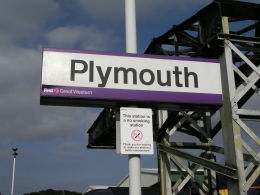Posted 28th April 2011 | 3 Comments
Potential boost for rail as West Country airport closes

A WEST COUNTRY airport is to close by the end of year, having lost its flights to London in February.
Plymouth City Airport had been struggling for some time, and its owners said the number of passengers had recently fallen to fewer than 100 a day.
A modal shift from air to rail within Britain has been getting stronger in the last year or two. ATOC said earlier this month that according to the first full analysis of industry figures, rail’s market share on the 10 most popular domestic air routes in 2010 grew to 44 per cent – up from 29 per cent in 2006.
Plymouth enjoys a frequent First Great Western intercity service to London, and the fastest trains take three hours to make the journey to Paddington.
Until February this year the city was served by daily flights to Gatwick, some of which also called at Newquay in neighbouring Cornwall, but these flights were withdrawn shortly after the airline, Air South West, was sold by the leaseholder of Plymouth Airport, Sutton Harbour Holdings.
Air South West is now owned by Eastern International Airlines and continues to operate flights on numerous routes from Newquay to destinations in Britain and Ireland, but its business from Plymouth had become very poor.
First Great Western ran a special train from Plymouth to London last October in just 2h43. FGW managing director Mark Hopwood said at the time that such timings were not yet possible on a daily basis, but that the new record time had 'showed what could be done'.
The far south west is not yet included in electrification plans for the Great Westerm route, and under present proposals would still be served by diesel HSTs after the line has been electrified between London, Bristol and Cardiff.
One of the government's reasons for promoting HS2 is to bring about a further transfer of business from short-haul domestic flights to rail between London, Manchester and Leeds/Bradford.
Reader Comments:
Views expressed in submitted comments are that of the author, and not necessarily shared by Railnews.

Bian Woods, Plymouth, UK
Locally the viewpoint in Devon on Railways is that its very much a tale of Devons two cities Exeter and Plymouth.Historically poor rail journey times between the two cities have and still are favouring Exeters economy over Plymouths.The recent IEP announcment that Plymouth services would retain HSTs while Exeter will get Bi-mode IEPs simply re-enforces that view locally that the far west is being completely left out of rail improvements nationally both now and in the future.The loss of the four daily Plymouth/Gatwick flights last February was a big blow in particular.
The first train from Paddington to Plymouth the 0730 does not get into Plymouth until 1117 some 3hours 40 minutes after leaving Paddington,Useless.Compare that to other similar distance cities to London
Tony Pearce, Reading, UK
There is a cutback in all levels of expenditure across the UK.
No-one has a clue how this is going to pan out on Transport.
Already Car usage on Motorways is down.
I can't see Rail usage rising in the next 5 years as higher Rail fares and reduced disposable income come into effect. It might even go into decline.
People may just decide to holiday nearer to home and businesses decide that events like Conferences can be held in the local Hotel.
H Harvey, Birmingham
What is amazing about this is that DfT actively promoted domestic air routes and by actions such as inserting change of train to many of the cross country routes where once no change was required could be seen to discouraging rail travel and its replacement by air.
They also encouraged development of these local routes through route development funds. Add to this the covert funding of air travel through providing cheap airport charges funded through the rates and PFI/PPI.
Rails success is certainly a brick in the eye for the Anti Rail mandarins in the DfT and of course for those MPs who form a very strong lobby at the heart of government.
One wonders why McNulty was chosen to head up the investigation of rail operations. I smell a rat.